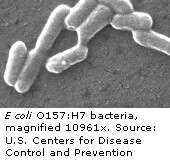Outbreaks of Shiga toxin-producing bacterium Escherichia coli O157 infection are mainly caused by food, especially beef and leafy vegetables, according to a study published in the August issue of the U.S. Centers for Disease Control and Prevention's Emerging Infectious Diseases.
(HealthDay)—Outbreaks of Shiga toxin-producing bacterium Escherichia coli O157 infection are mainly caused by food, especially beef and leafy vegetables, according to a study published in the August issue of the U.S. Centers for Disease Control and Prevention's Emerging Infectious Diseases.
Katherine E. Heiman, M.P.H., from the CDC in Atlanta, and colleagues summarized reports of E. coli O157 infections in the United States from 2003 to 2012 to examine patient demographics and epidemiology findings by transmission mode and food category.
The researchers identified 390 outbreaks during the study period, including 4,928 illnesses, 1,272 hospitalizations, and 33 deaths. Transmission was through food (65 percent of outbreaks) or via person-to-person contact (10 percent) or indirect or direct contact with animals (10 percent) and water (4 percent). The mode of transmission was different or unknown in 11 percent of outbreaks. Beef and leafy vegetables, combined, were the source of >25 and >40 percent of all E. coli outbreaks and related illnesses, respectively. Higher hospitalization rates were seen for outbreaks attributed to foods generally consumed raw versus those generally consumed cooked (35 versus 28 percent). Most waterborne outbreaks occurred in states that bordered the Mississippi River.
"More E. coli O157 outbreaks were reported during 2003-2012 than during the previous 20 years, probably because of continued improvements in surveillance," the authors write. "Outbreaks in the United States continue to be caused mostly by contaminated food, especially beef."
More information: Full Text
Journal information: Emerging Infectious Diseases
Copyright © 2015 HealthDay. All rights reserved.























